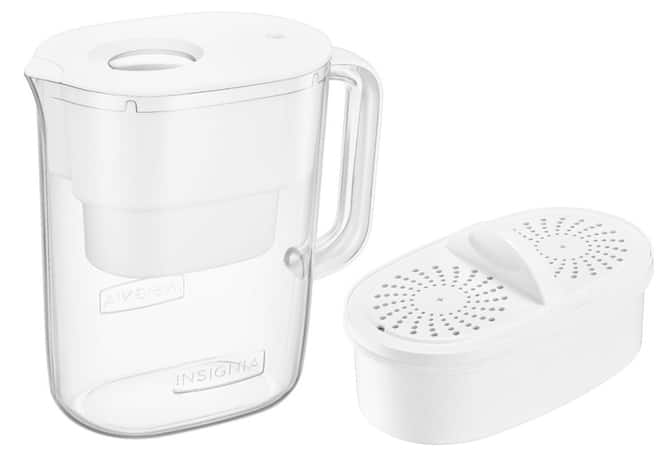How to Choose the Best Water Filter for Your Home

carousel
It’s reasonable to be concerned about the quality of your tap water. Municipal water systems have to treat water, usually with chlorine, to ensure it doesn’t carry dangerous levels of pathogens and remove traces of sediment, lead, cadmium, and arsenic that can be found in tap water. Plus, you may not love the smell or flavor of the minerals that your local water contains.
To circumvent the issues above, many people choose bottled water as an alternative. However, bottled water can be expensive and creates waste by using numerous plastic bottles and containers. And a lot of bottled water — when it’s not natural spring water — is just glorified tap water. Private companies buy tap water from municipal water systems, filter it, and then sell it back to you.
So, why not save yourself the money and trouble by filtering tap water yourself? From countertop models to whole-house systems, there are many different types of water filters. But how do you choose a water filter that meets your specific needs? Below are some questions to ask yourself to help narrow down your options.
What do you want to filter out of your water?
To figure out which water purifier is best for you, first consider the type of particles you want to filter out. For instance, there are water purifiers that remove lead and heavy metals and ones that focus on chlorine or fluoride. There are purifiers that leave in a lot of minerals, like calcium and magnesium, and others that soften the water by taking them out. At the more heavy-duty end of the scale, there are reverse-osmosis water filtration systems that filter out nearly all contaminants and minerals in your water.
To get a clearer sense of what you want to remove from your water, you need an understanding of what could be in your water. If you are on a municipal system, you can usually find your city’s records on the chemical and contaminant levels in your local water. You can also use at-home water test kits. These are especially useful if you are concerned about what old pipes in your house might be leaching into your water.
If your home uses well water, you might have to run your own tests. Reverse osmosis systems can sometimes be the best choice for well water users who live in agricultural areas where a lot of pesticides and chemicals may penetrate through the soil.
Where do you place different types of water filtration systems?
When it comes to adding a water filter to your home, you have several options for placement. For example, you may have room for a water dispenser to sit on your kitchen counter. These kinds of purifiers can hook up to your pipes and provide a small faucet of their own, which can be very convenient. Or, you can choose a water dispenser that attaches under your kitchen sink, which can be ideal for saving space, but may require a little more installation.
Does your faucet have a filter-friendly spout? If so, you could place a purifier there (as long as the faucet is high enough above the sink that the filter will not get in the way of doing dishes). You could also choose a water pitcher purifier. These are easy to use, but sometimes, they can’t hold enough water for a whole family and need to get refilled at an annoyingly frequent rate.
If you are in the market for a new refrigerator, you can save money by choosing a refrigerator with a built-in water filter. This is a great option if your family will consistently use it. Keep in mind that refrigerator water dispensers typically fill glasses and cups a bit more slowly than a regular faucet. Also, if your water bottle is too large, you might have a hard time fitting it under the faucet.
Aside from the water you drink, you may also want to filter the water you shower with or use in your washing machine. Some people like to filter shower water because the chemicals in it can disperse into the air, allowing you to breathe them in while showering.
Another reason you might want a water filter on your shower head is that certain sediments can affect your hair’s texture. You can, of course, combine multiple methods on the list, or you can filter the water for your entire house at once. Your decision depends on how much your budget is and how easy you’d like your setup process to be.
How much is your budget for a water purifier?
Unsurprisingly, a purifier for the entire home is likely the most expensive and labor-intensive option; it requires installation and an investment in the system itself. Although, once you have the water filtration system in place, it filters the water coming out of every faucet in your home, which can be very convenient.
Alternatively, pitcher purifiers are usually the cheapest option, but you can only filter a limited amount of water at a time. Meanwhile, kitchen counter or under-the-sink water purifier systems range in price from low to high, depending on how much they filter out.
When estimating expenses for a water filter, remember that you will be paying for replacement filters in the future as sediment builds up inside the purifier. Plan wisely by seeing how often you will have to replace the filter and then calculating how much each filter will cost.